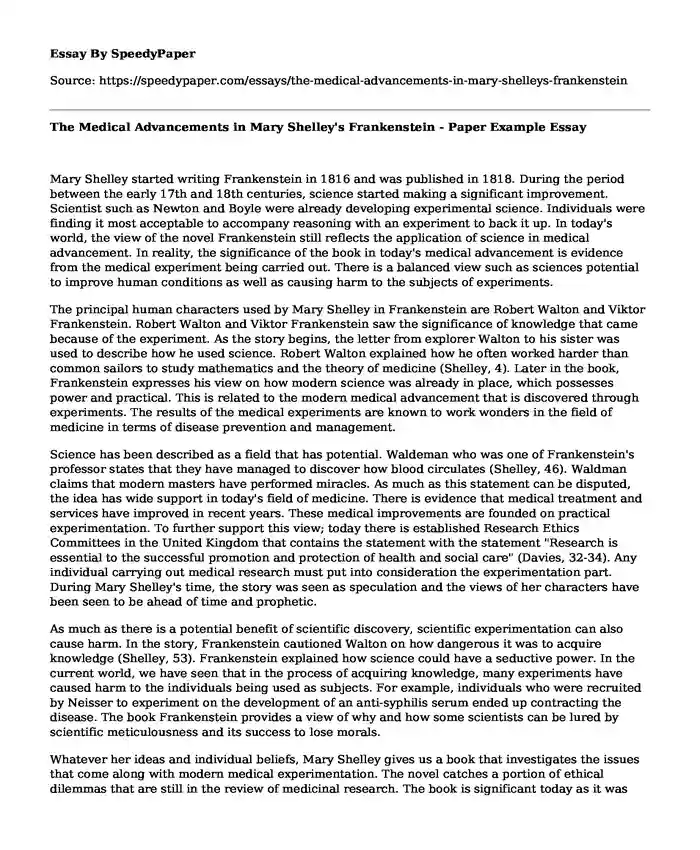
| Type of paper: | Critical thinking |
| Categories: | Medicine Ethical dilemma Frankenstein World literature |
| Pages: | 3 |
| Wordcount: | 615 words |
Mary Shelley started writing Frankenstein in 1816 and was published in 1818. During the period between the early 17th and 18th centuries, science started making a significant improvement. Scientist such as Newton and Boyle were already developing experimental science. Individuals were finding it most acceptable to accompany reasoning with an experiment to back it up. In today's world, the view of the novel Frankenstein still reflects the application of science in medical advancement. In reality, the significance of the book in today's medical advancement is evidence from the medical experiment being carried out. There is a balanced view such as sciences potential to improve human conditions as well as causing harm to the subjects of experiments.
The principal human characters used by Mary Shelley in Frankenstein are Robert Walton and Viktor Frankenstein. Robert Walton and Viktor Frankenstein saw the significance of knowledge that came because of the experiment. As the story begins, the letter from explorer Walton to his sister was used to describe how he used science. Robert Walton explained how he often worked harder than common sailors to study mathematics and the theory of medicine (Shelley, 4). Later in the book, Frankenstein expresses his view on how modern science was already in place, which possesses power and practical. This is related to the modern medical advancement that is discovered through experiments. The results of the medical experiments are known to work wonders in the field of medicine in terms of disease prevention and management.
Science has been described as a field that has potential. Waldeman who was one of Frankenstein's professor states that they have managed to discover how blood circulates (Shelley, 46). Waldman claims that modern masters have performed miracles. As much as this statement can be disputed, the idea has wide support in today's field of medicine. There is evidence that medical treatment and services have improved in recent years. These medical improvements are founded on practical experimentation. To further support this view; today there is established Research Ethics Committees in the United Kingdom that contains the statement with the statement "Research is essential to the successful promotion and protection of health and social care" (Davies, 32-34). Any individual carrying out medical research must put into consideration the experimentation part. During Mary Shelley's time, the story was seen as speculation and the views of her characters have been seen to be ahead of time and prophetic.
As much as there is a potential benefit of scientific discovery, scientific experimentation can also cause harm. In the story, Frankenstein cautioned Walton on how dangerous it was to acquire knowledge (Shelley, 53). Frankenstein explained how science could have a seductive power. In the current world, we have seen that in the process of acquiring knowledge, many experiments have caused harm to the individuals being used as subjects. For example, individuals who were recruited by Neisser to experiment on the development of an anti-syphilis serum ended up contracting the disease. The book Frankenstein provides a view of why and how some scientists can be lured by scientific meticulousness and its success to lose morals.
Whatever her ideas and individual beliefs, Mary Shelley gives us a book that investigates the issues that come along with modern medical experimentation. The novel catches a portion of ethical dilemmas that are still in the review of medicinal research. The book is significant today as it was during the year it was published. It can be lacking a modern ethical framework since it has not addressed all issues, but it is a provocative narration that gives direction.
Works Cited
Davies, H. "Can Mary Shelley's Frankenstein Be Read As An Early Research Ethics Text?". Medical Humanities, vol 30, no. 1, 2004, pp. 32-35. BMJ, doi:10.1136/jmh.2003.000153.
Shelley, Mary. Frankenstein. 1818.
Cite this page
The Medical Advancements in Mary Shelley's Frankenstein - Paper Example. (2022, Dec 23). Retrieved from https://speedypaper.com/essays/the-medical-advancements-in-mary-shelleys-frankenstein
Request Removal
If you are the original author of this essay and no longer wish to have it published on the SpeedyPaper website, please click below to request its removal:
- Essay Example on Quantum Computing
- Free Essay Sample on Anabolic Steroids and Substance Dependence
- Religion and Spirituality, Free Example for Everyone
- Marketing Essay Example: Target Markets for Specific Products
- Essay Sample on Customer Acceptance of Dynamic Pricing
- Essay Sample on Climate-Related Issues
- Free Essay Example - New Software for the Insurance Agency
Popular categories




